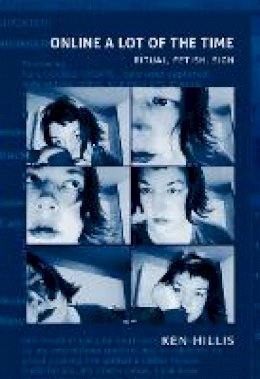Ken Hillis is Associate Professor of Media Studies at the University of North Carolina, Chapel Hill. He is the author of Digital Sensations: Space, Identity, and Embodiment in Virtual Reality and a co-editor of Everyday eBay: Culture, Collecting, and Desire.
“[A] rich volume in theory and striking examples about the virtual phenomena of avatars, webcam personas, rituals, fetish and signs. It’s a must read for everyone interested in the field of virtuality. A book that has grabbed the fullest of my interest due to my own personal interest in the virtual phenomena of avatars, the rituals in play and the digital ‘body’. . . . So this book is a keeper, you should try it!” - Denise Pires, Masters of Media “Hillis provides a rich and extensive span of academic and cultural references to contextualise his claims. I found this invaluable in providing a framework in which to situate Hillis’s contribution to the field of theory, including work on ritual, fetish, sign and discourses of virtual presence and online identity. . . . This book can be recommended to researchers and enthusiasts interested in online interaction, virtuality and social study, as well as standing out for its succinct and thoughtful exploration of ritual, fetish and sign theory.” - Hilary Wheaton, Media International Australia “[A]n expert account of online relations in general and the relation of user (or participant, in Hillis’ terms) to avatar in particular. . . . As a trans-disciplinary work it will be a valuable resource for those working in a wide range of fields, such as media theory, cultural studies, sociology and philosophy. . . . [A]lways an interesting, provocative and insightful read. This is a fascinating account of life online.” - David W. Hill, Continuum “[A] strong contribution to the sociological study of communications technologies: the location of online interactions within broader socio-historical context and cultural theory. . . . - Sarah Michele Ford, Contemporary Sociology “The real strength of the work lies in the sustained historicization of ‘virtual’ life and Hillis’s perspective on the temporalities that are at stake in online life. On these counts, there are some real delights to be found.” - Dawn Nafus, American Anthropologist “Ken Hillis has written an engaging philosophical exploration of the dilemmas confronting Euro-Americans when they begin to use online communication. He is intellectually generous to anthropologists and their conceptual impulses, exploring a series of questions that can aid ethnographers interrogating Euro-American media ideologies surrounding new media.” - Ilana Gershon, American Ethnologist “Online a Lot of the Time tackles the complex subject of telepresence more convincingly than anything else around. It suggests that the sign/body of an online digital avatar occupies a ‘middle ground,’ analogous to the ‘middle voice’ produced through the novel’s technique of free indirect discourse, in which the avatar functions as more than an image but less than an autonomous agent. Moreover, because of the psychic investments that operators project into the avatar, it also functions analogously to a fetish—or rather, a telefetish. Building on previous theorizations of the fetish, the book makes a decisive intervention by showing that these concepts can fruitfully be extended into the virtual realm. With an impressive range of references, including commodity theory, media theory, the history of the telegraph, and a host of other areas, Online a Lot of the Time is essential reading for anyone interested in virtuality and its effects.”—Katherine Hayles, author of Electronic Literature: New Horizons for the Literary “[A] rich volume in theory and striking examples about the virtual phenomena of avatars, webcam personas, rituals, fetish and signs. It’s a must read for everyone interested in the field of virtuality. A book that has grabbed the fullest of my interest due to my own personal interest in the virtual phenomena of avatars, the rituals in play and the digital ‘body’. . . . So this book is a keeper, you should try it!”
Denise Pires
Masters of Media
“[A] strong contribution to the sociological study of communications technologies: the location of online interactions within broader socio-historical context and cultural theory. . . .
Sarah Michele Ford
Contemporary Sociology
“[A]n expert account of online relations in general and the relation of user (or participant, in Hillis’ terms) to avatar in particular. . . . As a trans-disciplinary work it will be a valuable resource for those working in a wide range of fields, such as media theory, cultural studies, sociology and philosophy. . . . [A]lways an interesting, provocative and insightful read. This is a fascinating account of life online.”
David W. Hill
Continuum
“Hillis provides a rich and extensive span of academic and cultural references to contextualise his claims. I found this invaluable in providing a framework in which to situate Hillis’s contribution to the field of theory, including work on ritual, fetish, sign and discourses of virtual presence and online identity. . . . This book can be recommended to researchers and enthusiasts interested in online interaction, virtuality and social study, as well as standing out for its succinct and thoughtful exploration of ritual, fetish and sign theory.”
Hilary Wheaton
Media International Australia
“Ken Hillis has written an engaging philosophical exploration of the dilemmas confronting Euro-Americans when they begin to use online communication. He is intellectually generous to anthropologists and their conceptual impulses, exploring a series of questions that can aid ethnographers interrogating Euro-American media ideologies surrounding new media.”
Ilana Gershon
American Ethnologist
“The real strength of the work lies in the sustained historicization of ‘virtual’ life and Hillis’s perspective on the temporalities that are at stake in online life. On these counts, there are some real delights to be found.”
Dawn Nafus
American Anthropologist

